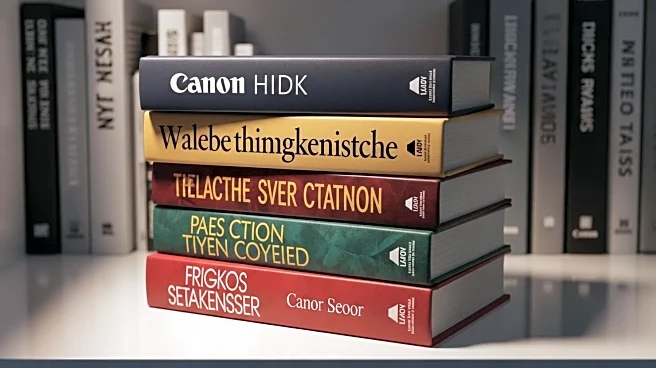What's Happening?
The Frankfurter Buchmesse, one of the world's largest book fairs, is emphasizing the importance of literature in a polarized global context. The event highlights the challenges faced by authors due to
censorship, book bans, and cultural conflicts. Juergen Boos, the president and CEO of the Buchmesse, stressed the need for platforms where authors can be heard, especially those who are silenced or banned. The fair is addressing threats to the freedom of expression, publication, and reading, which are under pressure from political and cultural wars. The event also focuses on the role of artificial intelligence in the publishing industry, exploring its impact on translation, editing, and rights management.
Why It's Important?
The emphasis on banned books and censorship at the Frankfurter Buchmesse underscores the ongoing cultural and political conflicts affecting the publishing industry. These issues have significant implications for the freedom of expression and the dissemination of diverse perspectives. Libraries and publishers face challenges in maintaining a wide range of genres and voices, as political filtering impacts grants and collections. The fair's focus on these topics highlights the need for international cooperation and dialogue to protect literary freedoms and support authors facing censorship. The event serves as a critical platform for discussing the future of publishing in a rapidly changing world.
What's Next?
The Frankfurter Buchmesse is expected to continue fostering discussions on the role of literature in society, particularly in the face of censorship and cultural conflicts. The event will likely lead to increased collaboration among international organizations, such as the United Nations and Amnesty International, to support authors and publishers. The fair's focus on artificial intelligence in publishing may drive innovation in translation and rights management, potentially reshaping the industry. Stakeholders in the publishing world will need to navigate these changes while advocating for the protection of literary freedoms and diverse voices.
Beyond the Headlines
The discussions at the Frankfurter Buchmesse may have long-term implications for the publishing industry, particularly in terms of ethical considerations surrounding censorship and the use of artificial intelligence. The event highlights the need for a balance between technological advancements and the preservation of human creativity and expression. As the industry evolves, stakeholders must consider the cultural and ethical dimensions of these changes, ensuring that literature remains a tool for connection and understanding across diverse communities.











